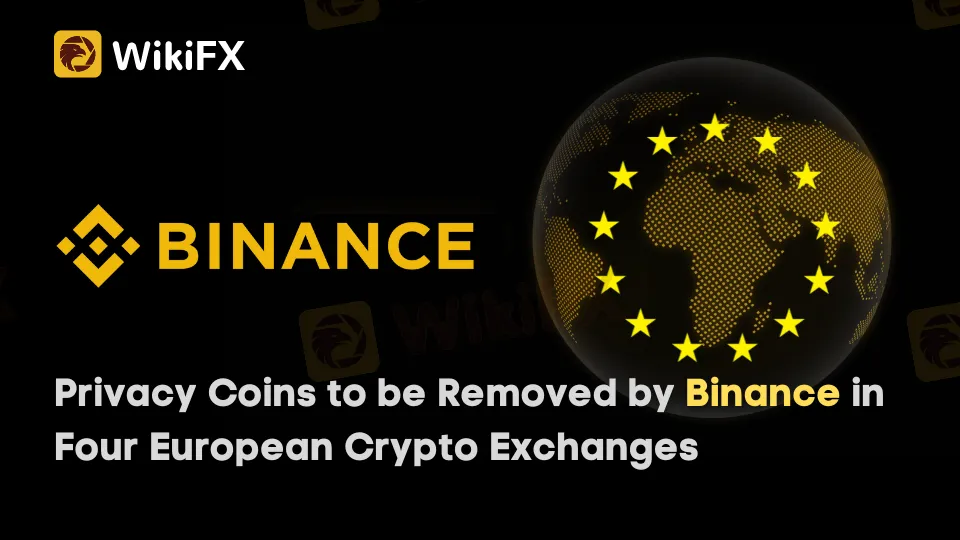简体中文
繁體中文
English
Pусский
日本語
ภาษาไทย
Tiếng Việt
Bahasa Indonesia
Español
हिन्दी
Filippiiniläinen
Français
Deutsch
Português
Türkçe
한국어
العربية
Privacy Coins to be Removed by Binance in Four European Crypto Exchanges
Abstract:Binance plans to delist 12 privacy coins, including Monero and Dash, from its platforms in Spain, France, Poland, and Italy due to regulatory pressures.

Binance, a prominent name in the realm of crypto exchanges known for its massive trade volume, recently unveiled plans to delist 12 privacy-centric digital currencies from its trading platforms in four European countries. Effective from June 26, 2023, crypto enthusiasts residing in Spain, France, Poland, and Italy will find themselves unable to buy or trade these specific privacy-oriented cryptocurrencies on the Binance platform.
Binance to Delist 12 Privacy Coins in Spain, France, Poland, and Italy:
The decision of Binance to exclude these privacy coins in Spain, France, Poland, and Italy was conveyed to its customers in the respective countries via emails. The list of digital currencies on the chopping block includes popular privacy coins like dash (DASH), verge (XVG), beam (BEAM), monero (XMR), navcoin (NAV), firo (FIRO), horizon (ZEN), secret (SCRT), zcash (ZEC), pivx (PIVX), decred (DCR), and mobilecoin (MOB).
In a communique to its French clientele, Binance elaborated, “Due to local regulatory obligations, we regret to inform you that Binance cannot continue offering privacy-centric digital currencies in France.” The email further read, “Starting from June 26, 2023, users located in France will not be able to buy or trade the aforementioned privacy coins via our platform.”
The fallout from this news had an immediate impact on the market.
Privacy coins recorded a 3.2% drop in value against the US dollar on Wednesday. As it stands, the aggregate market capitalization of all extant privacy coins is roughly $5.73 billion. Monero (XMR) is at the forefront of this group, despite witnessing a 2.4% dip. DASH, the second-largest privacy coin in terms of market capitalization, endured a fall of 3.5%. Notwithstanding these setbacks, the leading five privacy coins have shown a positive trend when evaluated based on the last week's metrics.
This is not the first instance of privacy coins facing delisting due to regulatory apprehensions. In 2021, major cryptocurrency exchanges in South Korea opted to eliminate several leading privacy coins from their platforms. A similar trend was observed in Japan back in 2018, which subsequently pervaded numerous other Asian nations in 2019. The recent announcement from Binance regarding its privacy coin delisting is another notch in its belt of regulatory obstacles, coming on the heels of its exit from the Canadian market and its confrontations with a local payment provider in Australia.
Ensure you're in the loop with the most recent news by downloading and setting up the WikiFX App on your mobile device. You can download the app from this link: https://social1.onelink.me/QgET/px2b7i8n

Disclaimer:
The views in this article only represent the author's personal views, and do not constitute investment advice on this platform. This platform does not guarantee the accuracy, completeness and timeliness of the information in the article, and will not be liable for any loss caused by the use of or reliance on the information in the article.
Read more

OctaFX Flagged by Malaysian Authorities
OctaFX has been officially listed on warning lists by both Bank Negara Malaysia (BNM) and the Securities Commission Malaysia (SC). These alerts raise serious concerns about the broker’s status and whether it is legally allowed to operate in Malaysia.

TradingPRO: A Closer Look at Its Licences
In an industry where safety and transparency are essential, the regulatory status of online brokers has never been more important. For traders seeking to protect their capital, ensuring that a platform operates under recognised and stringent oversight can make all the difference. Keep reading to learn more about TradingPRO and its licenses.

Oil Price Breakout Incoming? Investors Should Stay Alert
Oil prices are hovering around a critical level, with potential yet to be fully unleashed. Investors must prepare for sudden changes.

New SEBI Regulations on Intraday Trading
The Securities and Exchange Board of India (SEBI) has implemented revised regulations on Intraday trading, with effect from November 20, 2024. These regulations are meant to lessen risks and prevent speculative trading practices.
WikiFX Broker
Latest News
SkyLine Guide 2025 Malaysia: 100 Esteemed Judges Successfully Assembled
Vantage Markets Review 2025: Trusted Forex and CFD Trading Since 2009
Why STARTRADER Is Popular Among Traders?
A Guide to Intraday Forex Trading You Can't Miss Out
CONSOB Blocks Access to 13 Unauthorized Investment Websites
TradingPRO: A Closer Look at Its Licences
The world could be facing another ‘China shock,’ but it comes with a silver-lining
New SEBI Regulations on Intraday Trading
Everything You need to know about Barath Trade
IronFX Broker Review 2025: A Comprehensive Analysis of Trustworthiness and Performance
Currency Calculator



